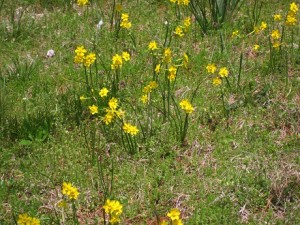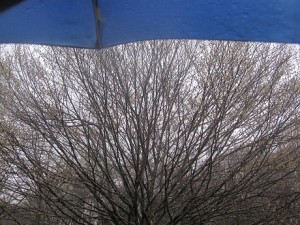Who are the violets now
That strew the green lap of the new-come spring?
Shakespeare, Richard II
Purple and blue stain the landscape. Virginia bluebells and violets thrive in the moist places this cool season along with fern and bleeding heart, all reliably deer-resistant. You can eat the petals as well as the young leaves of the violet.
As we plant to rejuvenate and restore habitats, we must remember early spring larval food for butterfly and other pollinator caterpillars as well as nectar for the adults to sip later in the summer. Violets feed the great spangled fritillaries; spicebush and sassafrass host the spicebush swallowtails which have newly hatched here in the hollow, just as the various milkweeds nourish incipient monarchs.
This is the peak of a prolonged daffodil season with mid-season Segovia and Salomes just beginning to fade and Haweras and jonquillas coming into their own. A good succession of bloom can be got from the early cheery yellow Tete-a-tetes followed by the old Bari Conspicuous (an heirloom introduced 1869 that was here in the hollow when I came), then Segovia, Hawera, ending with the very late N. biflorus, the old Twin Sisters, that always marks the end of daffodils for us (and have not yet shown their heads).
www.brentandbeckysbulbs.com and www.vanengelen.com are reliable mail order sources for all kinds of bulbs. The Heaths’ Daffodils for American Gardens is the indispensable reference.
BEECH WATCH CONTINUES
After sitting still for weeks, the beech has begun to burst into life, the male buds swelling in a coppery haze with the females still tightly wrapped in their dark brown barrels. In all seasons, this is to me the most beautiful of our native trees, loving the lowlands and the company of holly.




